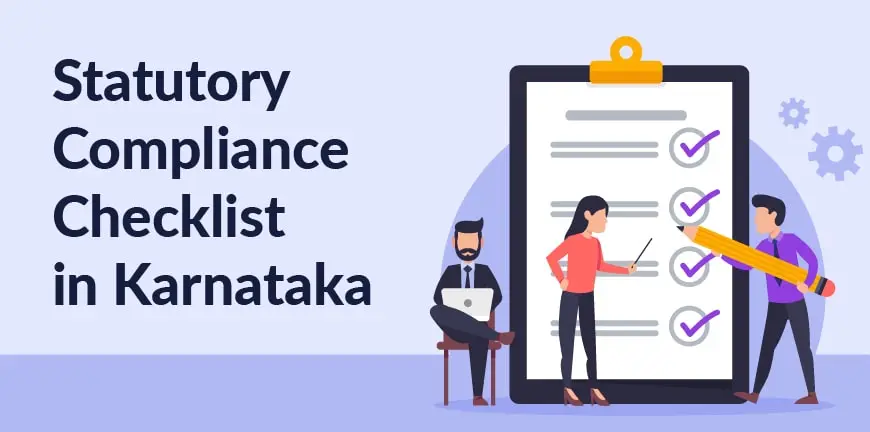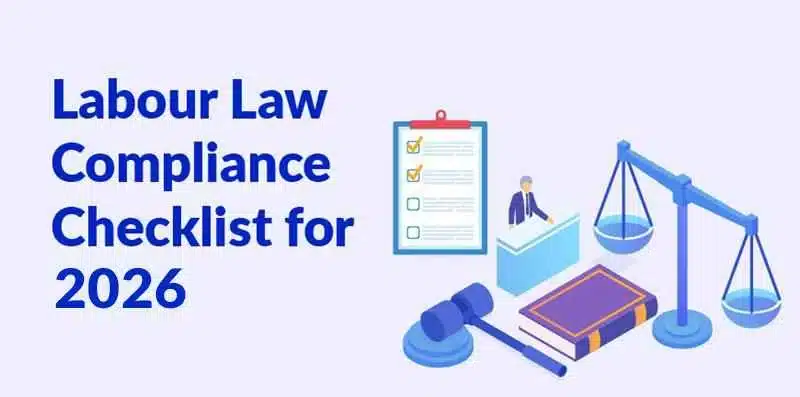
Generational Shifts: Managing and Engaging the Gen Z and Alpha Workforce
20/01/2025
5 Challenges to Remote Work and How to Overcome Them
27/01/2025A former employee is disgruntled enough to press charges against your company in the Karnataka High Court. Turns out your company refused the full maternity leave and did not provide the salary that was due. But that wasn’t the truth. You got your numbers wrong and for that reason ended up in court. A statutory compliance checklist for Karnataka may have saved you in time.
Your intentions were right, and you did grant the maternity leave, but you just didn’t know the mandatory duration or the salary that was to be paid. And you always thought you couldn’t put a foot wrong. You stuck to your company’s policy, but that did not conform to the statutory compliance checklist in the state of Karnataka.
What is Statutory Compliance?
Statutory compliance in HR means the adherence to laws and regulations for employment and employee-employer relationships laid down by a state or central authority. They help regulate a business’ functioning. In this article we will be discussing the statutory compliance checklist in Karnataka.
Why is Statutory Compliance Important?
Staying on track with statutory compliance helps businesses avoid hefty penalties due to negligence and helps them mitigate risks and ensure a safer, healthier and congenial workplace. Statutory compliance also ensures that there is a living document of rules for proper governance and later internal company policy could also be derived from it. All these together will even increase the efficiency of business operations.
List of Statutory Compliances in Karnataka
As per the Ministry of Labour of the State Government of Karnataka, there are some laws that every business that falls into its jurisdiction must adhere to. The labour laws and enactments that will be enforced by the labour ministry of Karnataka are:
Payment of Wages Act, 1936 – Governs payment of wages to employees, indirect and direct.
Industrial Employment Act, 1946 – To have business owners formally define conditions of employment and submit it for certification.
Minimum Wages Act, 1948 – Guarantees a minimum wage to every employee.
Plantation Labour Act, 1951 – To regulate the conditions of work and ensure labour welfare in plantations.
Working Journalists and other Newspaper Employees and Miscellaneous Provisions Act, 1955 – To regulate the conditions governing service rendered by journalists and others in the newspaper industry.
Shops and Commercial Establishments Act, 1961 – To regulate conditions of work in shops and commercial establishments in Karnataka.
Motor Transport Workers Act, 1961 – To provide for the welfare of motor transport workers and to regulate the conditions of their work.
Maternity Benefit Act, 1961 – To provide for maternity benefits for pregnant mothers.
Karnataka Industrial Establishments (N&FH) Act, 1963 – To grant national and festival holidays to people working in industrial establishments.
Payment of Bonus Act, 1965 – Provides for a minimum bonus as a percentage of the total wages.
Karnataka Labour Welfare Fund Act, 1965 – Contributions must be made to the Karnataka Labour Welfare Fund.
Beedi and Cigar Workers Act, 1966 – To ensure welfare of beedi and cigar workers and to ensure conditions of work are satisfactory.
Contract Labour Regulation and Abolition Act, 1970 – To regulate contract labour in organisations and to provide for its abolition if necessary.
Payment of Gratuity Act, 1972 – For the payment of gratuity to those working in factories, mines etc.
Equal Remuneration Act, 1975 – To ensure equal remuneration to both sexes, without any conditions.
Sales Promotion Employees Act, 1976 – To provide medical and other leave assurances and fixed times of service for sales personnel, especially in Pharma.
Child and Adolescent Labour Act, 1977 – Abolition of child labour, and additional fines if made to work in hazardous conditions.
Inter- State Migrant Workmen Act, 1979 – To protect the rights of inter-state migrant workers and to ensure that proper work conditions are provided.
Building and Other Construction Workers Act, 1996 – To provide for welfare of building and other construction workers and to regulate conditions of work.
Closing Words
That’s a long labour law compliance checklist for the state of Karnataka. Are you ready to manage it all by yourself? If not, you might need the assistance of a dedicated HR partner. Alp Consulting, headquartered in Bangalore, Karnataka, is uniquely positioned to meet your needs in recruitment, staffing, compliance and payroll, no matter what they are.
We have been managing the compliance needs of several businesses with branches in Karnataka for nearly 25 years. Talk to us, so that we can help you meet your compliance needs and ensure that you do not pay those hefty fines in the future. Let us help you build a great workplace where labour law compliance requirements in Karnataka are met, and where your employees are happy and feel well-looked after.
Contact Us For Business Enquiry

Hariharan Iyer
Hariharan Iyer is the Vice President – Operations at ALP Consulting, bringing over 40+ years of experience in HR outsourcing and labour law compliance. He leads end-to-end HRO operations, ensuring process efficiency, statutory compliance, and seamless service delivery for clients across industries. With a strong background in labour law governance and workforce management, Hariharan plays a key role in driving operational excellence and compliance-led HR solutions at ALP Consulting.




